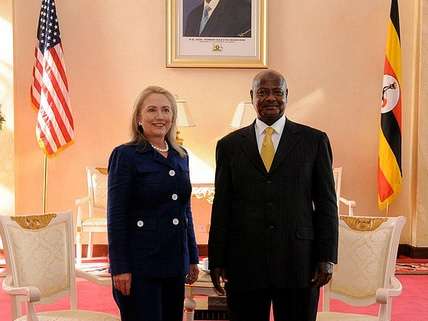Uganda's President Has His Own Trump-Russia Hot Take: Let's Work Together When We Can
The authoritarian, who has been a beneficiary of U.S. support in the war on terror, also called Western leftists "dangerous."

Uganda's president, Yoweri Museveni, who has been in power for thirty one years, offered his own ideas about President Trump, and U.S. relations with Russia as well as with the rest of the world, writing in an open letter that he heard Trump call for "convergence rather than divergence" and that he agreed—that Western countries ought to work with countries in the developing world on issues of common interest, like counter-terrorism, science education, the emancipation of women, trade, and democracy, but leave them alone on issues like "family, forms of democracy, homo-sexuals, central planning versus economic liberalization."
Museveni in recent years has been the beneficiary of the U.S. war on terror, receiving military and other support as his regime became increasingly more authoritarian. A 2014 law criminalizing homosexuality did not deter the U.S. from its support. Museveni argued in his letter that Western leftists, by "trying to impose all their views and values on everybody in the world… generate not convergence but divergence and even conflict."
Museveni continues into his historical views—arguing that the communist revolutions in Russia and China "greatly assisted" African people because they supported decolonization. Museveni also blames World War I and World War II on Western imperialists, going back to the Ottoman capture of Constantinople, which he argued closed the land route to Asia and encouraged Europeans to look for other routes, leading them to Africa and the Americas. He continues to World War I by framing it as a war among empires looking to control colonies in Africa and the Americas, and offers a revisionist account of World War II where Joseph Stalin wanted an alliance with the West against Nazi Germany from the beginning. Eventually, Museveni gets to the break-up of the Soviet Union, bemoaning that in its wake Russia's "positive contributions" were ignored by a West more interested in forcing Russia to "submit" to its "dictates," instead of cooperating where possible. He compared it to the West's treatment of developing countries.
In the end, Museveni circles back to Trump, writing that while Trump asks about "the possibility of working with Russia against common threats," Western leftists "then shout that Mr. Trump must be having a secret agenda with Mr. Putin etc. This is why we could think of looking into the possibility of talking about the Trump Therapy for strategic myopia and recklessness in the West."
Some in Uganda have a very different kind of optimism about Trump. While Museveni would seem to believe he will continue to enjoy U.S. support during the Trump administration (and nothing in the last 28 days suggests otherwise), before the election some believed Trump could spell an end to such support. A pro-Trump protest in Kampala, Uganda's capital city, in October by members of the conservative party's youth wing included a sign that declared "A vote for Trump is a vote against African dictatorships!"
Read the entire missive here.
